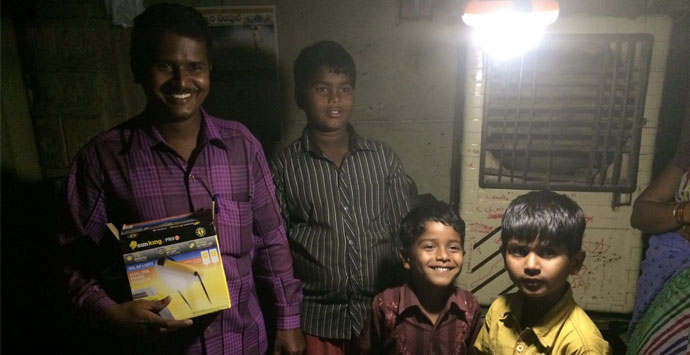Heading home from Hyderabad
I’m Zara Marais, an environmental scientist based in Melbourne, Australia. With my AECOM colleagues, Sean Holmes and Louis Scipione, I’m taking part in Pollinate Energy’s Young Professionals Program (YPP) in Hyderabad, India. As the program draws to a close and we prepare to head home, I’ve begun to reflect on our time here and the things that I’ll take away from this experience.
One skill that I’ve definitely improved on during my time in India is thinking on my feet. This is something we watched Pollinate’s Hyderabad city co-founders Paul and Pascal do every day as they ran the local office, known as the Hive. Examples of some of their hurdles included having the washing machine break down while there were 10 extra guests in the house. We witnessed the successful installation of the Hive’s first air-conditioning units; however, the installation team made an electrical error that left us without electricity for several days.
As we started to make progress on our Working Bee projects, the co-founders encouraged us to take on more responsibility around the office. This gave us a taste of the chaos and the rewards of their day-to-day work. On the day that I was to give a presentation to five women who had expressed an interest in becoming Pollinators, we had a six-hour power cut. To add to the challenge, we soon discovered that all five of the women only spoke Hindi. All of the presentation material was either in English or Telugu (the local language in the state of Telangana). We ended up running the presentation off of my half-charged laptop — translating the English messages from the slides and videos into Hindi with the help of Sweta, Pollinate Energy’s human resources manager. We then approached all of the Hindi speakers in the office for help, and interviewed each of the applicants in teams of three.

We all had a chance to practice thinking on our feet each evening as we entered communities with trainee Pollinators. Every community was different; sometimes, we received a warm welcome, and at other times we were met by a skeptical crowd. Every sale had to be approached from a different angle once the needs of a particular community were understood. Some communities already had access to electricity, but supply was unreliable and came at a high cost. Meanwhile, other communities had an alternative source of light (such as coconut oil lamps) but were paying daily to charge their mobile phones at local stores. The new Pollinators had to figure out which benefits of the solar product to focus on, and it was our job to prompt them with ideas if they got stuck. A good sales pitch and a dose of persistence were often rewarded, and it was always great to see smiles on the faces of both the customers and the Pollinators each time a sale was made.
Although the air-conditioning is usually working in my office, and I know I’m unlikely to lose my electricity if I pay my bills, my life at home, of course, has its own hurdles. I’ll definitely be using my new problem-solving skills long after my plane hits the tarmac in Melbourne, and I know I’ll always think back to my experience in Hyderabad. I’d strongly encourage anyone who’s looking for an unforgettable challenge and a dose of inspiration to apply for next year’s YPP.
Visit the Pollinate Energy website for more information on how you can become part of its Young Professionals Programme.
 Zara Marais (Zara.Marais@aecom.com) is a professional environmental scientist with AECOM’s Impact Assessment and Permitting team in Melbourne, Australia, and an enthusiastic bird-watcher. She is still buzzing from a recent encounter with an Eastern Ground Parrot during a trip to southwest Tasmania.
Zara Marais (Zara.Marais@aecom.com) is a professional environmental scientist with AECOM’s Impact Assessment and Permitting team in Melbourne, Australia, and an enthusiastic bird-watcher. She is still buzzing from a recent encounter with an Eastern Ground Parrot during a trip to southwest Tasmania.
LinkedIn: Zara Marais






